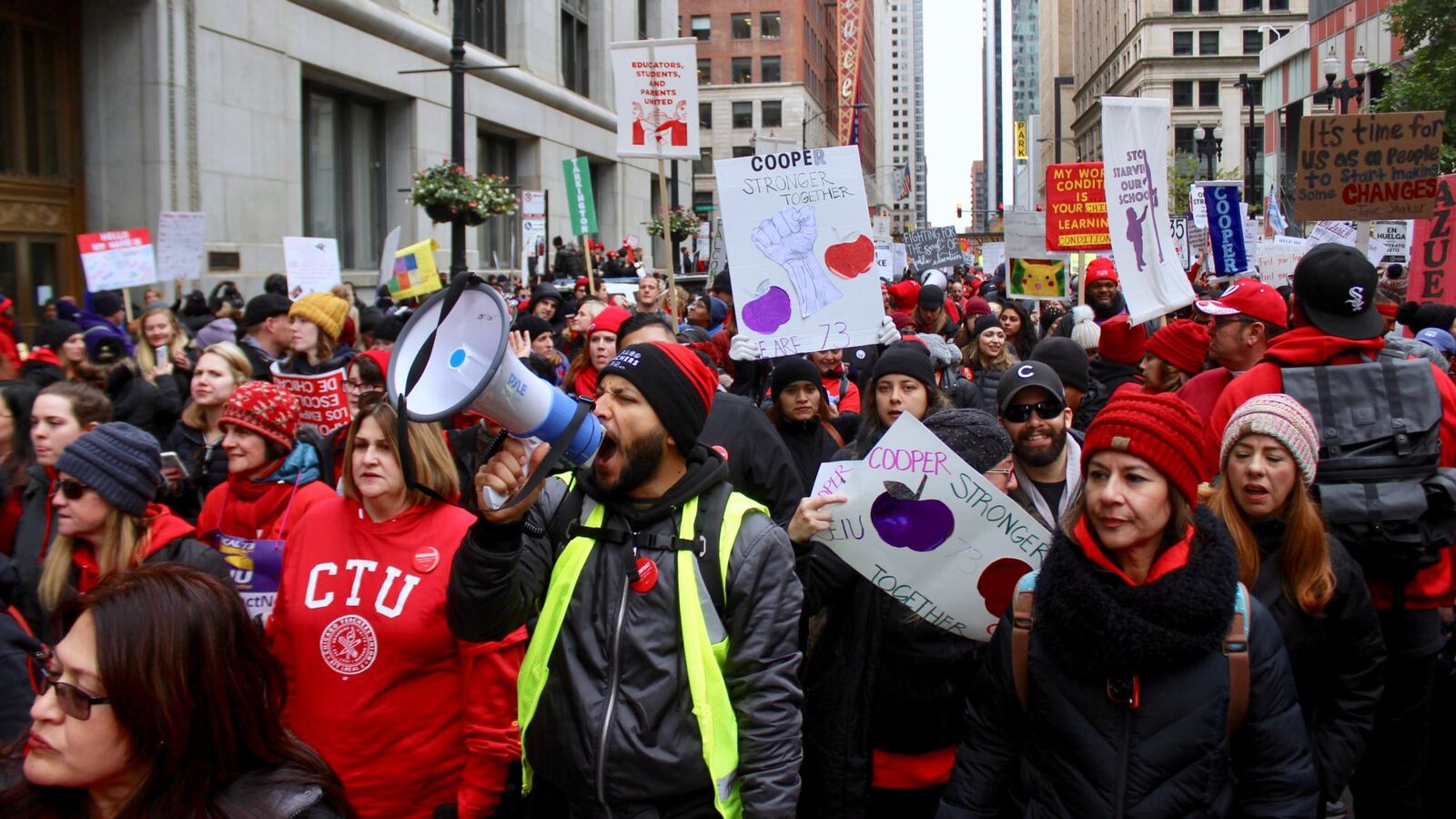It’s not just pay and more staffing: If Chicago’s Board of Education votes Wednesday to approve a contract for its 25,000 teachers, it will also agree to wrestle with some big policy questions, including the way the district funds schools.
The tentative agreement includes “side agreements” that cap the number of new charter schools, commit leaders to revisiting the school funding formula, and aim to inject equity into the ratings policy used to rank schools.
It shows how the Chicago Teachers Union wields its contract negotiations to shape district policy, particularly in controversial areas like charter school growth. Union officials say that by attaching language to their contract, the union has effected a districtwide slowdown in the growth of the privately run, publicly funded charter schools.
Two of the side agreements in the new contract, on school funding and ratings, are included for the first time. The agreement on charter school mirrors a side letter included in the last contract.
While some of these are broad, University of Illinois Urbana-Champaign labor expert Bob Bruno said they aren’t simply symbolic. Side letters are agreements in union contracts that don’t directly address working conditions, but are areas that both sides consider important to come to agreement on in a contract. Unless stated otherwise, side letters are enforceable under the same grievance procedures that guide the rest of the contract.
“Both sides can use side letters to be really creative and build a kind of common purpose,” Bruno said. “If they agree, they fully intend to live up to the side agreements.”
But one limitation of side letters is that they generally don’t come with a deadline. That means some conversations could be kicked years down the road.
Chicago teachers voted overwhelmingly to ratify the five-year agreement last week. Now the Chicago Board of Education must approve the deal. The next board meeting is 10:30 a.m. Wednesday at Chicago Public Schools headquarters.
Here are four of the issues that the board, if it passes the contract, will also agree to take on:
Revisiting the way it budgets for individual schools
The district currently bases school-level funding on enrollment, with extra funding for students with disabilities, for those living in low-income households, and for campuses with concentrations of English-language learners. It also provides grants for schools with the lowest enrollment.
The union, joined at times by unlikely education reform allies, has long called for the district to adopt a more nuanced funding formula accounting for student needs by school and community — for example, by making grants for students who are homeless or who are refugees.
The side letter on budgeting “confirms that CPS will continue to engage in a process to review school funding and modify as needed, in order to increase equity.”
It’s not certain how that will happen. Mayor Lori Lightfoot promised to reconsider this school year how Chicago funds schools and to explore ways to spend more on students with the most need. So far, the mayor’s office hasn’t changed its student-based budgeting. However, the district did announce a new round of investments in academic programs.
Reconsidering Chicago’s School Quality Rating Policy
The agreement on Chicago’s school ratings system “confirms” that the district will continue to change the ratings system to be more equitable.
The union has said the ratings system ranks schools in ways that disproportionately hurt black and Latino students. Last spring, it passed an internal resolution that promised to call for an end to the ratings system altogether as part of its contract demands.
The recently appointed Board of Education has tweaked the ratings formula and from next school year will factor in a new “on track” metric for elementary schools and grade high schools’ efforts to help students complete post-graduation plans. Those changes will dilute the effect on ratings of student attendance — a controversial metric since schools have little control over family circumstances that can prevent children from coming to school. The board, however, has stopped short of more sweeping changes. As Chicago’s test scores have flattened, fewer schools are earning the city’s top rating, according to data released the week after the strike ended.
Extending the moratorium on charter schools
The charter moratorium promises no new charter schools and limits charter enrollment over the course of the five-year contract. It essentially continues a moratorium from the Chicago Teachers Union contract of 2016, which broke new ground in Chicago.
The tentative agreement says charter student enrollment by the end of the contract will not exceed 101% of charters’ enrollment capacity as of last school year. Furthermore, there will be “net zero increase” in the number of charter schools.
While they’re unhappy with the continued limit, charter advocates say that it’s unlikely to make a material difference when many of Chicago’s charter schools, like district schools, are focused on retaining students as overall district enrollment shrinks
Union officials, however, say the charter freeze highlights how their activism and contract demands have shifted broader policy.
Supporting a new tax structure in Springfield
A significant amount of Chicago’s school funding comes from the state, which doles out money based on a funding formula that directs more money to districts with the neediest students.
One of Gov. J.B. Pritzker’s major policy proposals, to revise income taxes to tax wealthier people at a higher rate, could mean more money for Chicago schools, and could pay for the teachers and support staff contracts, which together are estimated to add $137 million to district expenses.
The agreement says the board and union will “support mutually agreeable legislation that calls for a sustainable state tax that is levied on a progressive basis.”
Illinois residents will have the chance to vote next fall on changing the state constitution to allow for a progressive income tax instead of the current flat tax rate.


